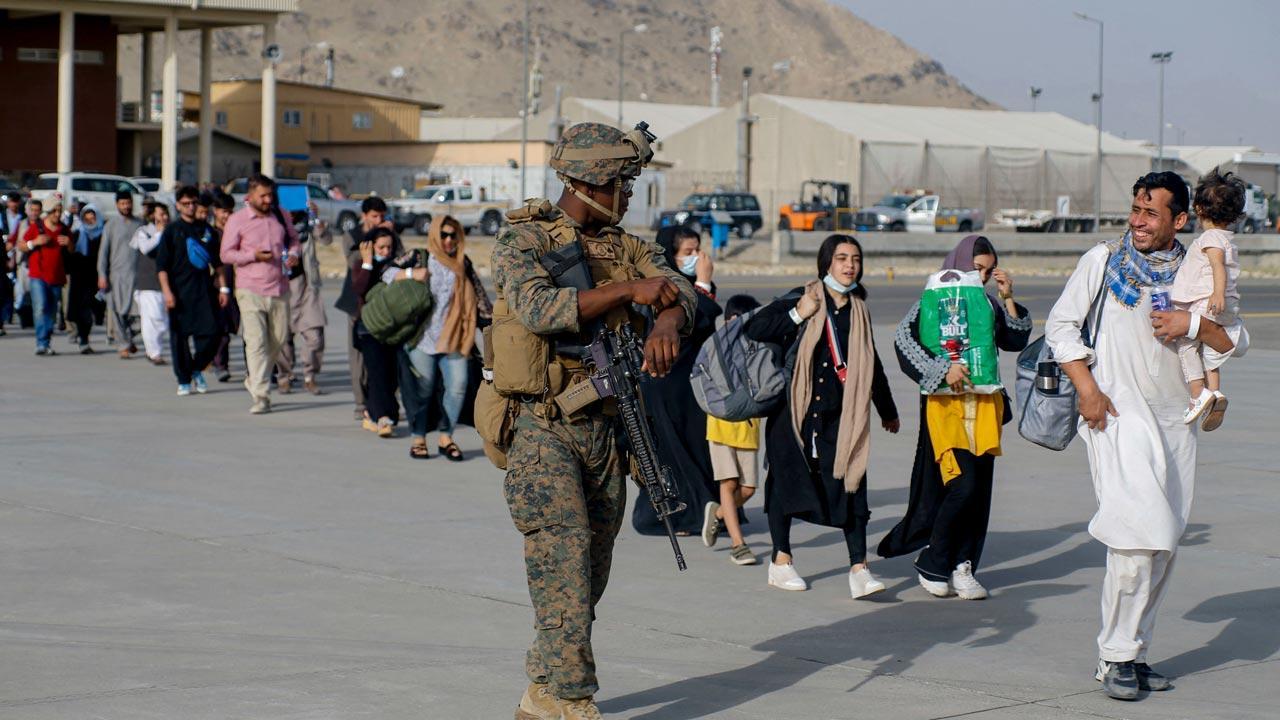The few women who are on the streets could be seen wearing the traditional blue burqa, the Islamic garb, which, despite being customary in Afghanistan, was not used as widely in Kabul until now

Expeditionary Unit escort evacuees during an evacuation at Hamid Karzai International Airport, Kabul, Afghanistan. Pic/AFP
Four days after the quick and unexpected invasion of Kabul by the Taliban, the streets of the Afghan capital are almost entirely devoid of women, The Guardian reported.
ADVERTISEMENT
The few women who are on the streets could be seen wearing the traditional blue burqa, the Islamic garb, which, despite being customary in Afghanistan, was not used as widely in Kabul until now.
Many women are dressed in the long black clothes commonly worn in the Middle East and Arab nations.
All the women are accompanied by a male guardian -- a requirement that the Taliban have imposed on women across the country. Many of these women were out grocery shopping; a simple task that has become extremely dangerous for them now.
Also read: Taliban take over Afghanistan: What we know and what's next
It is hard to believe that only a few days ago, the streets of Kabul were full of women going about their business, despite the encroaching security risk as the Taliban swept across Afghanistan.
Now, they walk fast and full of fear, their eyes constantly darting for any potential aggression from the Taliban fighters patrolling the once vibrant streets.
Since the Taliban's occupation of Afghanistan, all educational centres, schools, universities, government buildings and private offices have been closed.
On the city streets, there are no law or security officials; no police or traffic authorities who once provided a semblance of order. One resident of Kabul says he witnessed the Taliban driving police cars against the traffic in the middle of the road at high speed.
Pol e Sorkh, an area famous as the cultural centre of the young and educated generation of Afghanistan, is no longer lively. Roads and pavements are empty, except for a few sad and depressed-looking men who walk the streets out of boredom, the report said.
Laila Haidari, the owner of Taj Begum restaurant, wrote on her social media page: "The world changed for us forever. Taj Begum is no more."
She, along with many businesswomen, closed her restaurant after the fall of Kabul.
Another popular restaurant a few hundred metres away, also run by women, is closed. Those restaurants and cafes in Kabul that remain open have no female employees or customers. All beauty salons across the city are closed, although male barbershops are open.
This story has been sourced from a third party syndicated feed, agencies. Mid-day accepts no responsibility or liability for its dependability, trustworthiness, reliabilitsy and data of the text. Mid-day management/mid-day.com reserves the sole right to alter, delete or remove (without notice) the content in its absolute discretion for any reason whatsoever
 Subscribe today by clicking the link and stay updated with the latest news!" Click here!
Subscribe today by clicking the link and stay updated with the latest news!" Click here!






